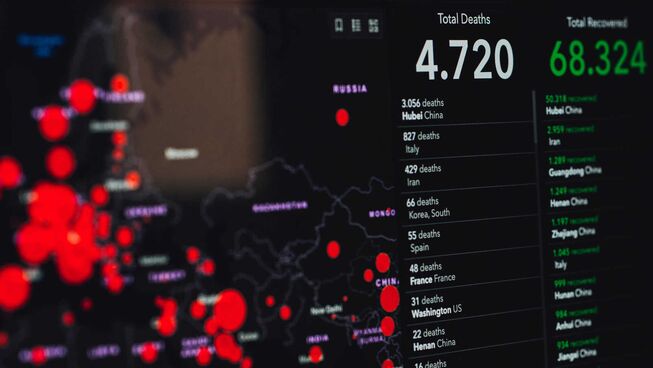“Coronavirus has cost me my job”

The projections are alarming. By some counts, over two million Australian casual jobs are at risk because of coronavirus [1], and that figure is constantly changing. If the projections are even close to being right, then if it’s not you, someone you know will be affected. Last week QANTAS stood down 20 thousand of its employees until the end of May. And just today Flight Centre has stood down 3800 staff. And these are just two of numerous examples.
How does the Gospel help us respond to this prospect, and how should we be ready to care for those made redundant? Here are three steps to take.
1. Unemployment is painful…and it’s right to feel that way
Part of what it means to be human is to work. The reason for this is we’ve been made in the image of a God who works. All of us are what I like to say, “wired to work”.
And it’s because of this very reason that unemployment is so painful. Unemployment attacks part of what it means to express our humanity. As the late English preacher John Stott once put it, unemployment is “an assault on our humanity” [2]. This does not mean that those who do not have paid work are sub-human. Rather it means that they may feel unable to express an aspect of their humanity, and that cuts at the core, “assaults”, their humanity.
I have known a brief season of unemployment in my life and it was not any easy experience. The sense of futility and purposelessness that pervaded each day can quickly lead to disillusionment and discouragement. So the first thing to affirm is unemployment is painful. It’s right if you feel this way. Don’t hide it or deny it if you’re feeling this way. And if you’re caring for someone who has lost their job be pastorally sensitive to this.
2. “You are never without work”
However a rich theology of work will recognise that in God’s economy, work is much bigger than just those activities that we are paid to do. As a result of this, my friend Kara Martin makes the point that “you are never without work”. “One of the sad features of modern society is the way that work is linked to pay. It means that much valuable work is not recognised or valued as highly, such as parenting, housework, caring for people, helping out at the local school or sporting team, and also the joyful work of praying and praising God. While I am lacking paid work, there is still plenty of meaningful work I am doing, and to be done”. [3]
You might not have paid work but there is still much valuable work that you can and might be doing. The reason again for this is because we’ve been wired to work. We are workers regardless of whether we are paid for it or not.
3. How to care for those being made redundant
In light of these two Biblical truths how can we care for those who have been made redundant in the wake of the coronavirus? Or if you have lost your job what could you do, or ask others to assist you with? Here are three suggestions:
a) Encourage people to keep working
As I mentioned above, in a brief season of unemployment I found myself very quickly becoming disillusioned and discouraged. Given all I’ve said about being “wired to work” one of the best things someone could have done for me during that season was encourage me to keep busy working, even if I wasn’t being paid for it. Continuing to find avenues to express that aspect of our humanity is an important way of stemming some of the discouragement that can quickly set in when we are made redundant.
b) Offer material and financial support
Being unemployed is not only going to assault our humanity. It’s also going to be an attack on our material and financial resources. In the last few weeks we’ve seen the really ugly side of how selfish Australians can be, hoarding goods while many go without. The temptation in this season will be to protect ourselves first and foremost. “How can I afford to support others, when I’m fearful I might run out, or I might be made unemployed?”
This is a time to practice what Jesus says in Matthew 6: “Do not worry about your life, what you will eat or drink; or about your body, what you will wear…seek first his kingdom and his righteousness, and all these things will be given to you as well” (6:25, 33). Your heavenly Father knows your needs and He loves you – He really does. So give, even if it hurts, to ensure those around you who are going without because of unemployment are fed and clothed.
Already great movements are happening (like the Facebook group Love your Neighbour) which assist us in knowing the needs of others so we might quickly respond. So again, give and support those in need, trusting your heavenly Father to provide for your needs.
c) Help them look for more employment
The discouragement that sets in quickly with unemployment can make it hard to maintain motivation to look for new work. So help those who lose work during this season to find more employment. Spend time with them looking for available jobs, assist them in the application process. Consider even going with them to job interviews – it’s really nice to know someone is waiting outside to debrief with you after an interview, who loves you and is supporting you in this search for more work.
These are just three simple suggestions, but get creative and explore other ways that you as an individual, and we as the church can be proactive in loving the increasing number of people who will be losing work because of coronavirus.
[1] https://www.dailymail.co.uk/news/article-8119339/Millions-Australians-lose-jobs-coronavirus-crisis.html
[2] John Stott, Issues facing Christians today, 228.
[3] au.thegospelcoalition.org/article/you-are-never-without-work-a-biblical-reflection-on-unemployment







